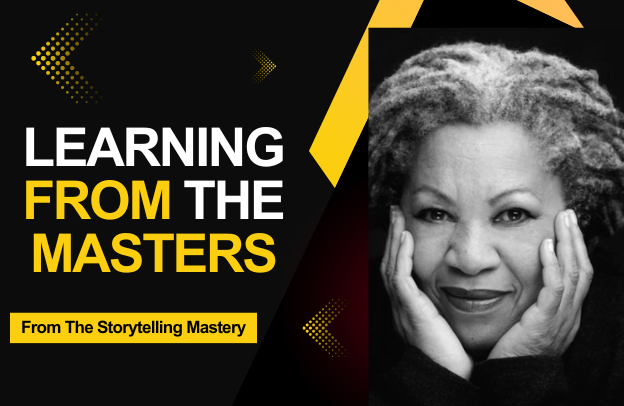What an elder sees sitting, a young man cannot see even climbing to a treetop

It used to be said that what an elder sees sitting, a young person cannot see even climbing to a tree top. Could that still be true today in an era that is characterized by rapid technological advancement and the overwhelming influx of information? Well, make no mistake about it, this adage continues to be relevant and it speaks volumes about the depth of experience and perspective that comes with age.
Want to learn more about storytelling? Start by downloading the first chapter of The Storytelling Mastery.
The reality is that certain insights and understandings usually elude us in our youth, only to become clear as we mature and accumulate more wisdom and experience in life.
This is what we are going to be exploring in these three profound life lessons derived from the wise saying “What an elder sees sitting, a young person cannot see even climbing to a tree top”. In the course of the presentation, we will examine their significance and practical application in our daily lives.
Lesson 1. The Value of Experience Over Impulsiveness
The proverb suggests that elders, with their extensive life experience, possess a unique ability to perceive complexities and nuances that may elude the young, no matter how energetic or ambitious they might appear.
This understanding comes not from physical vantage points but from a lifetime of accumulated knowledge and insight. Elders have witnessed patterns, cycles, and outcomes over the years, enabling them to predict and understand situations with a greater depth that youth often lack.
This depth of understanding is crucial in various aspects of life, from personal relationships to professional endeavors.
You might also like Embrace Three Important Lessons To Change Your Life: Impermanence, Authenticity, And Perspective
How to apply this lesson
In today’s fast-paced world, the rush to make quick decisions often leads to oversights and errors. Young people, driven by ambition and a desire for immediate success, may overlook critical details and long-term implications. Herein lies the importance of valuing the wisdom of experience.
By consulting those who have traversed similar paths, individuals can gain deeper insights and make more informed, balanced choices.
Consider the example of successful mentorship programs in the business world. Young entrepreneurs who seek the guidance of seasoned business veterans often benefit from their mentors’ experiences, leading to higher success rates and better decision-making.
For instance, a young tech startup founder might be eager to scale quickly, but a mentor with decades of industry experience might advise caution and strategic planning. This guidance can prevent premature expansion and ensure sustainable growth.
In personal life, the advice of elders can be equally invaluable. For example, in matters of relationships and family, elders who have navigated the complexities of long-term partnerships can offer perspectives that help younger individuals build stronger, and more resilient connections.
Now, here is my advice, if you are opportune to have wise elderly people around you, please listen to them.
Their experiences with conflict resolution, communication, and compromise can provide a foundation for younger generations to build upon.
Lesson 2. Patience as a Virtue: Long-Term Vision vs. Short-Term Gains:
Elders often possess the patience to see beyond immediate benefits, understanding the importance of long-term goals and sustainable growth. This stands in stark contrast to the younger generation’s tendency toward instant gratification, fueled by the digital age’s emphasis on quick results and immediate rewards.
The elder’s perspective emphasizes the value of patience and the ability to wait for the right moment, which is crucial for achieving lasting success.
In a world driven by quick fixes and rapid results, patience remains a critical attribute to becoming a better person. Whether in career growth, relationships, or personal development, the ability to wait and persevere can lead to more substantial and enduring success.
Patience allows individuals to navigate challenges and setbacks with resilience, ultimately achieving their goals through steady, consistent effort.
How to apply this lesson:
Incorporating practices such as mindfulness and long-term planning can help cultivate patience. Mindfulness encourages individuals to focus on the present moment, reducing anxiety about the future and fostering a sense of calm and clarity.
See also 15 Ancient African Proverbs on Growth And How To Apply Them
Long-term planning, on the other hand, involves setting realistic goals and creating a roadmap to achieve them, which helps maintain focus and direction over time.
For example, consider the story of a young professional eager to climb the corporate ladder. Impatient for promotion, they might feel frustrated by the slow pace of advancement.
However, by adopting a patient approach and seeking the counsel of experienced colleagues, they can develop the skills and knowledge necessary for long-term success. Patience, therefore, allows them to build a solid foundation, ultimately leading to more significant achievements and career fulfillment.
In personal development, patience is equally vital. For example, someone pursuing a new hobby or skill might become discouraged by initial difficulties.
By practicing patience and persevering through challenges, they can gradually improve and master the skill, gaining a sense of accomplishment and personal growth.
Lesson 3. The Importance of Respect and Humility
Another important value the proverb underscores is the need to respect and value the wisdom of elders. This respect fosters humility and openness to learning from others, essential traits for personal growth and community building.
By acknowledging the contributions and experiences of those who have come before us, we can create a culture of respect and mutual support, where knowledge is shared and preserved for future generations.
How to apply this lesson:
In today’s interconnected world, valuing diverse perspectives and respecting the knowledge of those who have come before us can enhance collaborative efforts and societal progress.
What that means is that respecting the wisdom of elders is not simply about diminishing the capabilities of the young but about fostering a symbiotic relationship where both generations benefit from each other’s strengths.
Initiatives, where younger generations engage with elder communities to learn about cultural heritage, offer a powerful example of this principle in action. For instance, in many African societies, storytelling is a traditional method of passing down history, values, and lessons. If you pay attention, you will realize that this is a value we talk a lot about in AClasses Academy.
See also Connecting with Your Tribe: Using Storytelling to Cultivate a Loyal Community
By participating in these storytelling sessions, younger individuals gain a deeper understanding of their roots and cultural identity, which enriches their lives and strengthens community bonds.
In the workplace, mentorship programs that pair young employees with experienced professionals create opportunities for mutual learning and growth. Younger employees bring fresh ideas and technological proficiency, while older employees offer strategic insights and institutional knowledge.
This exchange fosters innovation and ensures the continuity of organizational wisdom.
Conclusion on Embracing Ancient Wisdom in Modern Times
By integrating the lessons from the adage “what an elder sees sitting, a young person cannot see even climbing to a tree top,” we can cultivate a more balanced, thoughtful, and respectful approach to life.
These principles—valuing experience, practicing patience, and embracing humility—are not only timeless but increasingly vital in our fast-paced world. As we strive for progress, let us not forget the profound insights that the wisdom of our elders offers, guiding us toward a more grounded and enlightened existence.
Experience provides a depth of understanding that cannot be replicated through sheer effort or ambition. By recognizing the value of experience, we can make more informed decisions and avoid common pitfalls.
This is particularly relevant in fields such as business, where the stakes are high, and the consequences of impulsive decisions can be severe. Here are a few final notes:
Learn to cultivate Patience:
Patience is a virtue that allows us to navigate the challenges of life with resilience and grace. In a world that often prioritizes speed over substance, the ability to wait and persevere is a powerful asset.
By embracing patience, we can achieve more sustainable and meaningful success in all areas of life.
Fostering Respect and Humility:
Respecting the wisdom of elders fosters a culture of mutual support and continuous learning. Humility allows us to recognize that we can always learn from others, regardless of our age or experience.
This mindset is essential for personal growth and the creation of strong, cohesive communities.
Want to learn more about storytelling? Start by downloading the first chapter of The Storytelling Mastery.





